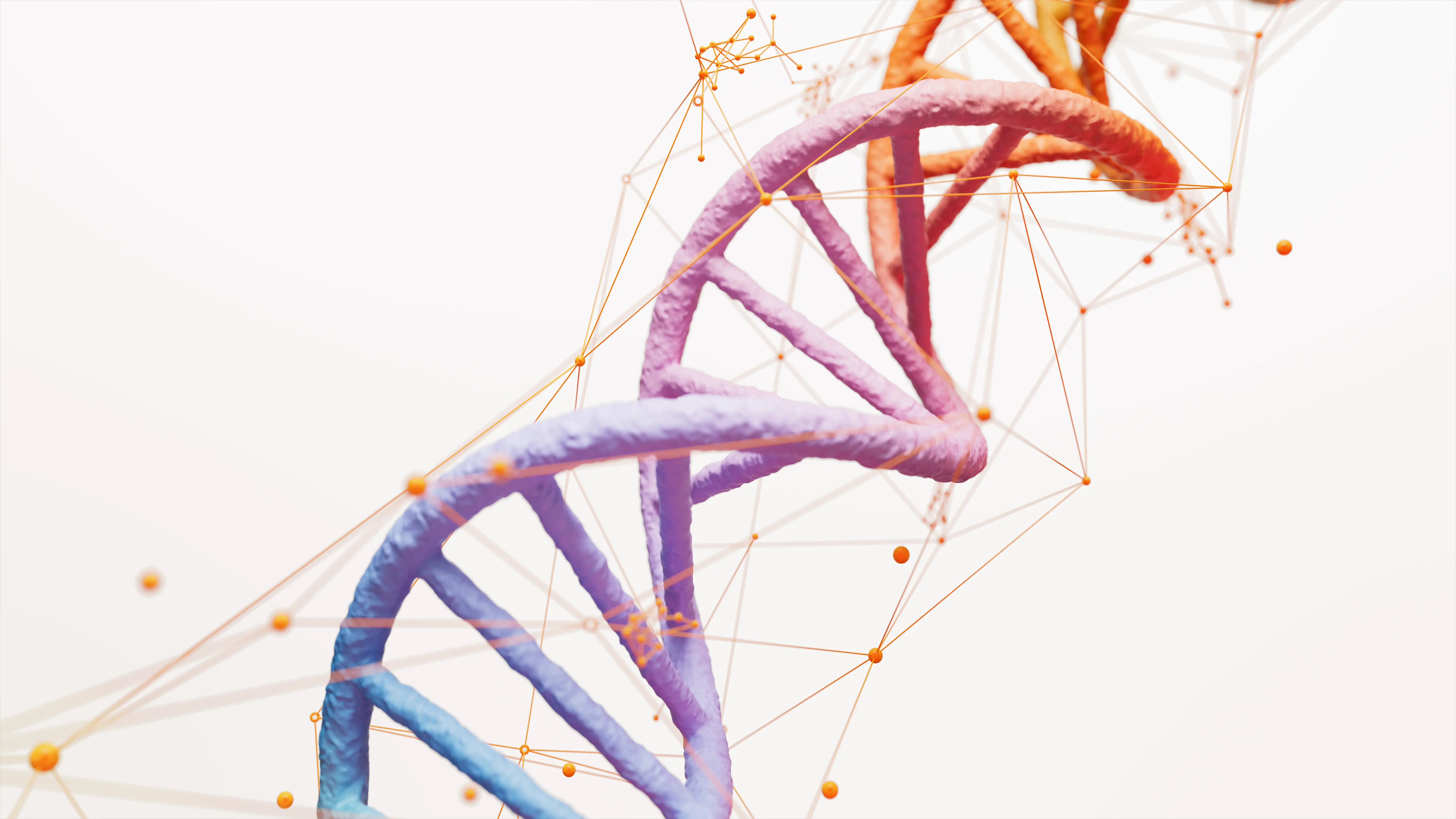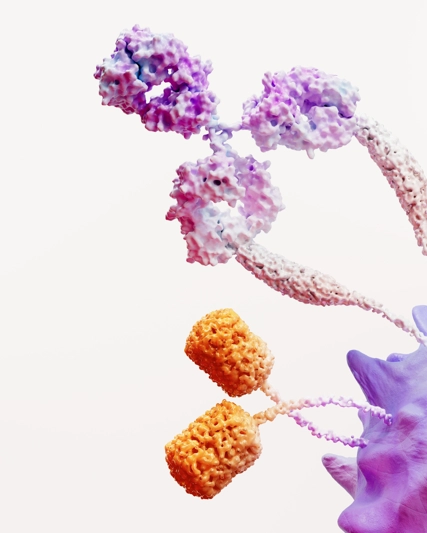Every five minutes, someone's life changes with a gynecological cancer diagnosis.1,2 And yet, according to a 2018 study, over two-thirds of women had not heard of ovarian cancer or knew anything about it prior to their diagnosis.3
September is Ovarian Cancer Awareness Month – a month dedicated to spreading awareness about this often overlooked disease. In honor of this effort, and GSK’s associated Five for Five initiative, here are five facts about biomarkers and genetic characteristics in ovarian cancer:
Genetic testing is different than genomic testing
A genetic test looks for mutations on specific parts of DNA, called genes, that may have been passed down by a family member. Testing for genetic characteristics can help determine if a person has an increased risk for developing certain types of cancers.4
A genomic test looks at your DNA as a whole, rather than specific parts of your DNA. In cancer, genomic testing can help determine changes in a person’s cancer cells to see if specific treatments may work better than others.5 HRD testing is an example of genomic testing often used in ovarian cancer. Genomic testing can also help healthcare providers assess if personalized cancer treatments may be appropriate down the line.
Genetic and genomic tests are conducted at different times – and in different ways5
Genetic testing can be done at any time, before or after a diagnosis, though it is typically used to assess potential risk of cancer, particularly if you have a family history. This type of testing is typically done during a specialized doctor’s office visit and consists of collecting a blood or saliva sample.4
Genomic testing is done following a diagnosis of cancer. This testing is often done on the tumor itself, and includes taking a sample of blood or the tumor, via biopsy or surgery.5
It is important to talk to a healthcare provider about questions you may have about genetic or genomic testing, like your or your loved one’s potential genetic risk or specific tumor type.
Genetic testing for a BRCA gene will not predict whether someone will develop cancer but can help assess one’s risk.6
BRCA is an acronym for the BReast CAncer mutation. BRCA1 and BRCA2 are human genes that produce proteins that repair damaged DNA. Every person has two copies of BRCA1 and BRCA2 that they inherit from each parent. Mutations, or harmful changes in BRCA1 and BRCA2, can carry increased risks of certain types of cancers, such as ovarian cancer.6
A positive BRCA test (also referred to as BRCA mutation or BRCAmut) means a person has a mutation of BRCA1 or BRCA2.6
A negative BRCA test (also referred to as BRCA wild type or BRCAwt) means that the gene remains in its original, non-mutated state.6 It is important to note that even if you are BRCA negative, this still could play a role in eligibility for future treatments.
A mutation in either BRCA1 or BRCA2 provides an increased lifetime risk of developing breast and ovarian cancers in women.7 Men with these gene mutations have an increased risk of breast and prostate cancers.6
Upon learning about a family history of breast or ovarian cancer, or if a loved one was recently diagnosed with breast or ovarian cancer, talk to your healthcare provider about genetic testing to help determine your risk. If you’ve already been diagnosed with ovarian cancer, you can still talk to your doctor about genetic and genomic testing as they could help determine your eligibility for future treatment, such as maintenance therapy.
HRD is not the same as BRCA
When DNA is repaired under normal circumstances, the process is called homologous recombination.7 Homologous recombination deficiency (HRD) is when this repair system no longer works properly, and therefore is unable to repair damaged DNA in the body’s cells. When a cancerous tumor tests positive for HRD, this means that its cancer cells have a harder time repairing themselves.8
HRD can occur as a result of a number of different gene mutations or other harmful changes in one’s DNA.7 A BRCA mutation is only one potential genetic cause for HRD.8
HRD is an important biomarker for advanced ovarian cancer, as it may help predict the way a tumor will progress, and in doing so, may help determine the most effective treatment option.
If your tumor is positive for HRD, it may mean that certain treatments are more likely to be effective. Be sure to talk to your doctor to ensure you’ve explored all potential treatment options.
“Biomarker testing can help doctors be more targeted in their treatment plans"9 said Gordana Vlahovic, MD, vice president and medicine development leader in immuno-oncology at GSK.
“For example, many patients with cancer have tumors with a high chance of recurring. The precision we can gain from biomarker testing in these types of tumors can help identify patients most likely to respond to treatment in more profound ways and for lengthier periods of time. This ultimately can lead to better long-term outcomes for the patient.”9
References
Learn the Facts. Join the Movement. Foundation for Women’s Cancer. https://foundationforwomenscancer.org/get-involved/move-the-message/#:~:text=Every%20five%20minutes%2C%20a%20woman,nearly%20115%2C000%20Americans%20each%20year. Accessed July 2024.
Weiss C. Women’s Wellness: 3 tips for gynecologic cancer awareness. Mayo Clinic. https://newsnetwork.mayoclinic.org/discussion/womens-wellness-3-tips-for-gynecologic-cancer-awareness/. Published September 3, 2020. Accessed July 2024.
The Every Woman StudyTM 2018 – Origin of the Charter. World Ovarian Cancer Coalition. https://worldovariancancercoalition.org/our-work/global-charter/road-to-the-charter/. Accessed July 2024.
Genetic Testing for Inherited Cancer Risk. National Cancer Institute.
https://www.cancer.gov/about-cancer/causes-prevention/genetics/genetic-testing-factsheet#:~:text=Genetic%20testing%20looks%20for%20specific%20inherited%20changes%20%28sometimes,increase%20the%20risk%20of%20diseases%20such%20as%20cancer. Last Reviewed April 18, 2024. Accessed August 2024.Cancer-related Genomic Testing and Genetic Testing. American Cancer Society. https://www.cancer.org/cancer/understanding-cancer/genes-and-cancer/genomic-genetic-testing.html. Last Revised November 2, 2023. Accessed July 2024.
BRCA Mutations: Cancer Risk and Genetic Testing. National Cancer Institute. https://www.cancer.gov/about-cancer/causes-prevention/genetics/brca-fact-sheet. Last Updated November 19, 2020. Accessed July 2024.
Petrucelli N, Daly MB, Pal T. BRCA1- and BRCA2-Associated hereditary breast and ovarian cancer. GeneReviews® - NCBI Bookshelf. https://www.ncbi.nlm.nih.gov/books/NBK1247/. Published September 21, 2023. Accessed July 2024.
Da Cunha Colombo Bonadio RR, Fogace RN, Miranda VC, Del Pilar Estevez Diz M. Homologous recombination deficiency in ovarian cancer: a review of its epidemiology and management. Clinics. 2018;73:e450s. https://doi.org/10.6061/clinics/2018/e450s. Published August 2018. Accessed July 2024.
Biomarker testing is helping doctors find precision treatments for patients that could dramatically improve health outcomes. GlaxoSmithKline. https://www.gsk.com/en-gb/behind-the-science-magazine/biomarker-testing-ai-tumours-hepatitis-respiratory-cancer/. Published October 3, 2023. Accessed July 2024.



